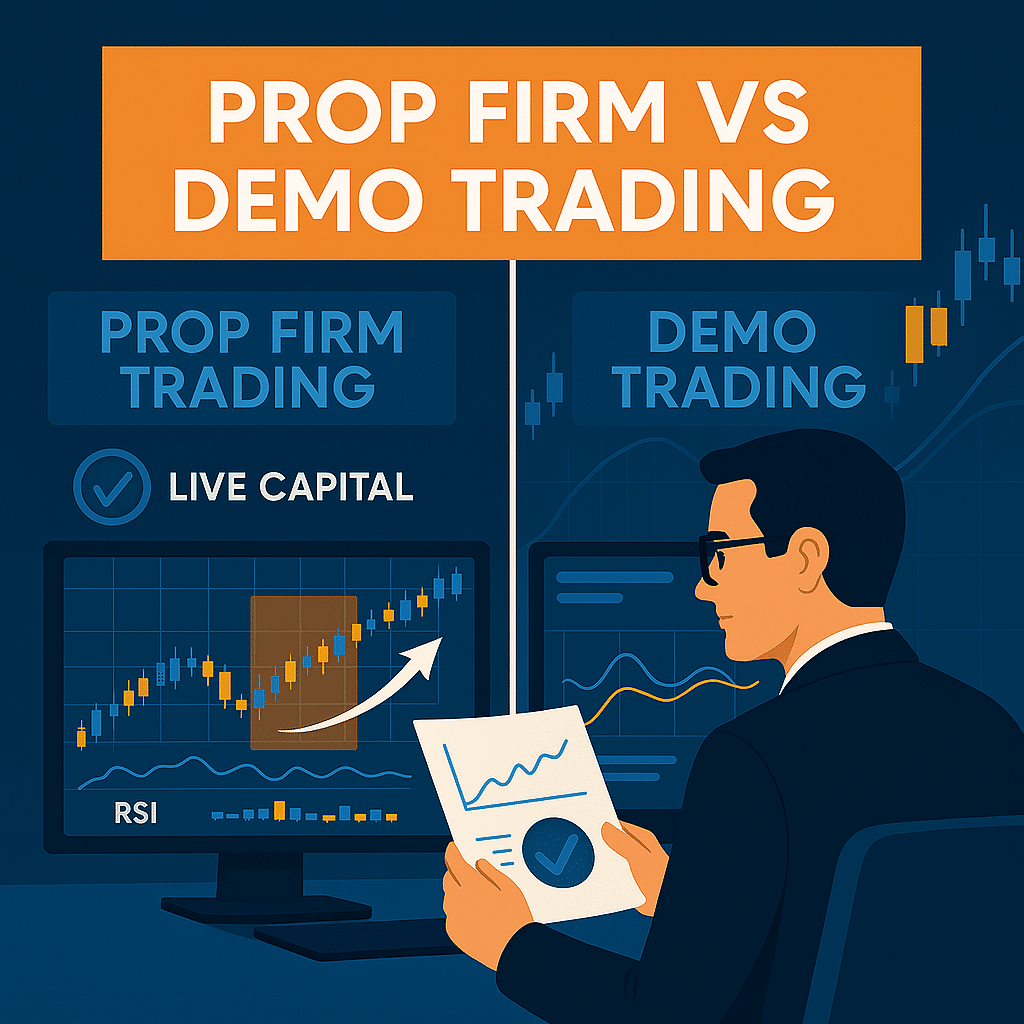Prop Firm vs Demo Trading: Funded Prop Trading vs. Demo Accounts
Choosing between prop firm vs demo trading is a critical decision for aspiring traders. While demo accounts offer a risk-free environment, funded prop trading introduces real-world challenges, accountability, and rewards. Understanding the key differences helps traders decide when to make the leap from practice to performance.
In this blog post, we’ll break down the core differences, benefits, and drawbacks of both paths—so you can decide what suits your trading journey best. Whether you’re starting out or preparing for a funded account with Larsa Capital, knowing the distinctions between these two trading paths is essential.
What Is Demo Trading?
Demo trading involves using simulated capital on a virtual trading platform. It mirrors real market conditions but without financial risk.
Key Features:
- Access to live or delayed market data
- Simulated balance and trading environment
- No emotional risk involved
Demo trading is typically used for:
- Testing strategies
- Learning platform features
- Practicing execution
While helpful for building initial confidence, demo accounts may lack realism when it comes to decision-making under pressure.
What Is Funded Prop Trading?
Funded prop trading means trading with real capital provided by a proprietary firm after passing a qualification process. Firms like Larsa Capital evaluate traders before allocating real funds.
Key Features:
- Real profit and loss
- Strict risk management rules
- Eligibility for payouts based on performance
Traders benefit from higher stakes, professional evaluation, and growth opportunities. The pressure is real, and so are the rewards.
Prop Firm vs Demo Trading: Core Differences That Matter
Let’s dive into the practical distinctions between prop firm vs demo trading that impact trader psychology, growth, and performance.
1. Emotional Engagement
In demo trading, losses don’t hurt. With prop accounts, every decision matters. Emotional control becomes critical.
2. Accountability
Prop firms track your metrics and enforce rules. In demo accounts, you may trade recklessly without consequences.
3. Risk Management Discipline
Prop trading demands consistent stop-loss usage and drawdown awareness. Demo trading allows more room for error.
4. Growth Potential
With prop trading, consistent performance leads to scaling opportunities. Demo accounts don’t offer real growth.
5. Real Payouts
Demo traders earn experience. Prop traders earn income.
Benefits of Demo Trading
1. Zero Risk
You can explore different markets, timeframes, and strategies without the fear of loss.
2. Platform Familiarity
New traders can learn order types, indicators, and charting tools without financial pressure.
3. Strategy Development
It’s the ideal environment to tweak and backtest systems before using real capital.
Limitations of Demo Trading
1. False Confidence
Many traders succeed in demos but fail in real environments due to pressure.
2. No Real Stakes
Without financial consequences, traders may take irrational risks or skip rules.
3. No Payout Path
Regardless of performance, demo trading offers no financial return.
Benefits of Funded Prop Trading
1. Realistic Experience
Prop accounts simulate institutional trading conditions, pushing traders to act professionally.
2. Earnings Potential
Payouts are based on performance. The better you trade, the more you earn.
3. Structure and Accountability
Rules around daily loss limits, profit targets, and time limits create a disciplined environment.
4. Trader Development
Firms like Larsa Capital provide feedback and structured paths for account scaling and long-term growth.
Risks of Funded Prop Trading
1. Performance Pressure
Traders may feel overwhelmed if they lack emotional control.
2. Limited Flexibility
Prop firms enforce trading guidelines. Violating rules can result in account suspension.
3. Financial Commitments
Most challenges require a fee, so poor preparation may lead to lost opportunities.
Subheading Featuring the Keyphrase: Choosing Between Prop Firm vs Demo Trading
So, which path should you choose? The decision between prop firm vs demo trading depends on your readiness, confidence, and financial goals.
Start with Demo If:
- You are still learning the platform
- Your strategy is untested
- You need to build basic risk management habits
Move to Prop Trading When:
- You’ve backtested and forward-tested your system
- You’ve developed emotional control
- You want to trade professionally and earn real income
Many traders start with demo accounts and eventually transition to funded trading once they’ve built consistency.
How Larsa Capital Bridges the Gap
Larsa Capital understands the value of both demo and funded environments. They offer evaluation programs that mimic live conditions, allowing traders to gradually adapt.
- Realistic metrics and goals
- Fair scaling plans for consistent performance
- Emphasis on trader growth and discipline
By combining simulation and structured funding, Larsa Capital provides a complete trading pathway.
Tips for Transitioning from Demo to Prop Trading
1. Treat Demo Like Real Money
Practice serious risk management and journaling even in a demo.
2. Set Milestones
Only move to prop trading once you’ve hit profitability goals consistently in your demo.
3. Backtest and Forward-Test
Ensure your strategy works in different conditions and doesn’t rely on luck.
4. Prepare Mentally
Funded trading adds psychological pressure. Practice mindfulness, discipline, and stress management.
Final Thoughts: From Simulation to Real Success
Choosing between prop firm vs demo trading is not about which is better universally, but which suits your current stage.
Demo trading is ideal for learning and testing. Prop trading is for performance, growth, and income.
With a firm like Larsa Capital, traders benefit from a structured path that supports development from both angles. Whichever stage you’re at, focus on discipline, preparation, and consistency—and you’ll be ready when it’s time to take the leap.

